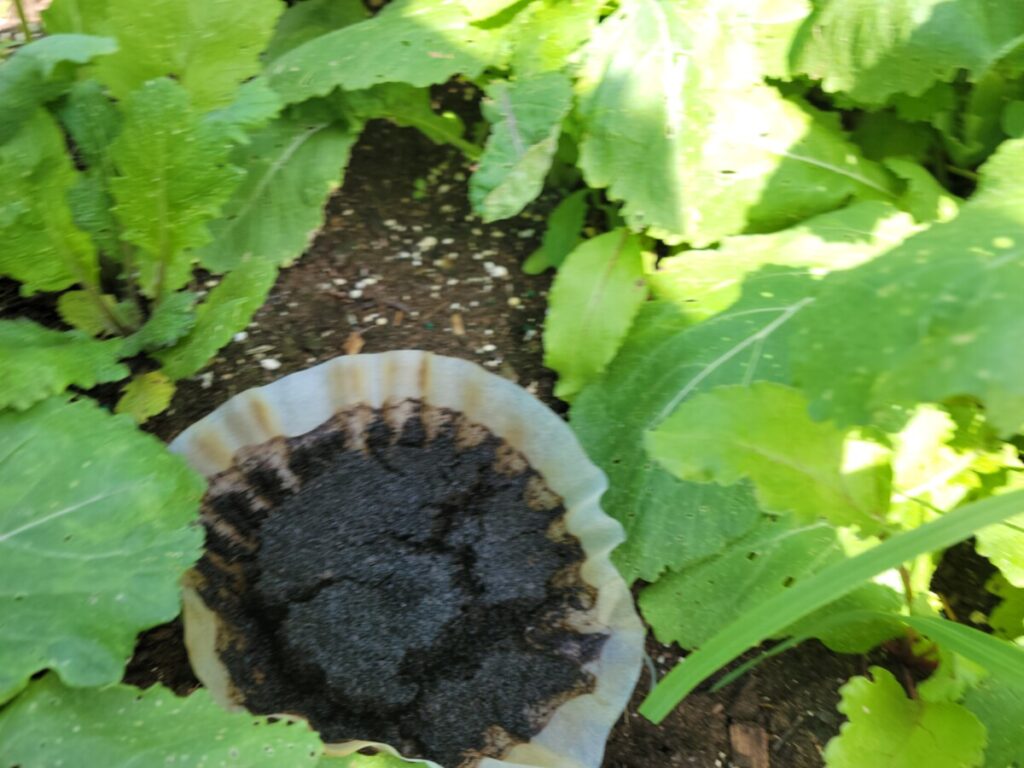
Coffee grounds can be put in gardens as a natural slow release fertilizer. Coffee grounds are rich in Nitrogen ,Phosphorus and potassium. Weather you need to add coffee grounds to your garden is an important question to ask yourself before doing it. Coffee grounds have a pH of 6.5-6.8 and a nitrogen volume of 2%. If you need to adjust a high or low pH soil to more of a neutral level coffee grounds work great. Also if your soil lacks required level of Nitrogen with a 20 to 1 ratio coffee will work great for that application over time as microorganism convert the coffee to nitrogen. In addition to its fertilizer quality there is evidence to suggest coffee grounds repel some varieties of insects. Animals with sensitive smell like deer and rabbits could be repelled by the smell of coffee grounds although this would be a short term result.
Can you put too much coffee grounds in your garden?
Yes you can add too much coffee grounds to a garden. Coffee grounds alter both the pH and nitrogen levels of the soil. By adding large amounts of coffee grounds you can mess up the balance of your soil in a way that would prohibit the growth of plant. Some ways to insure a safe use of coffee grounds is by adding them into a general compost pile. Coffee grounds add nitrogen to a compost pile and will help compost break down faster. Adding coffee grounds to compost can help create a well rounded garden compost that is safe for your whole garden. Alternatively you can rake the coffee grounds into soil directly and let the microorganism in your soil break it down over time. Below we will go more into which plants benefit the most from coffee grounds and a few you may want to avoid putting grounds on.
Which plants like coffee grounds?
There is a myth about coffee grounds that it is acidic. This has lead to people believing that coffee grounds are good to acidify your soil. It is often applied to blueberries, hydrangeas, lilies and other acid loving plants. Oregon State University did a study on the acidity of coffee grounds and concluded that the pH of coffee grounds are 6.5-6.8 ph. This means that coffee grounds will not acidify your soil. With that being said it could be used over time to bring your soil to a more neutral pH and through the use of microorganism in your soil breaking down the coffee grounds you can slightly increase you nitrogen levels. Read more about the best pH for garden soil in this post. Here are two list of vegetables and plants that like a pH of 6.5-6.8 and would benefit from coffee grounds added to there soil.
- Beans
- Carrots (paid link)
- Peppers (paid link)
- Squash
- Onions
- Lettuce
- Potatoes
- Sweet potatoes
- Rhubarb
- Radish
- Azalea (paid link)
- Boxwood
- Beauty Bush
- Crab Apple
- Dogwood
- Lilac (paid link)
- Willow
- Pink Flowing Hydrangea (read more here)
- Baby’s Breath
- Daffodil (paid link)
Which plants do not like coffee grounds?
Plants that need either an acidic or alkaline rich soil would not like Coffee grounds because over time the grounds would bring the soil to more of a neutral bases. You would need to review your soils pH levels to ensure you do not raise or lower your soil pH outside the plants desired levels. Here is a list of plants that do not like coffee grounds.
- Asparagus
- Cauliflower (paid link)
- Garlic
- Pumpkin (paid link)
- Tomato
- Aster
- Canna (paid link)
- Cosmos
- Crocus (paid link)
- Shasta daisy
- Geranium (paid link)
- Hibiscus (paid link)
- Hollyhock
- Phlox
- Pansy
Are coffee grounds good for the garden?
As we discussed above yes coffee grounds are good for the garden. However with myths surrounding coffee ground use it is important to look at your individual situation and planned use for the coffee grounds. Follow these points to decide if coffee grounds are a good solution for you.
Coffee grounds in compost: If you only plan to add coffee grounds to your existing compost as and additive than coffee grounds are a good choice.
Soil pH: What is the pH of my soil and do I want it to be amended to a more neutral pH of 6.5-6.8. If yes coffee grounds may be directly mixed into the soil. Take a look at other options for soil amendments in our Best Garden Soil Amendments post.
Nitrogen additive: If your soil lacks Nitrogen than applied coffee grounds over an extended period of time would lead to a slight increase in levels. Remember coffee grounds add Nitrogen through microorganism breaking down the grounds this takes time and is a longer term effect.
Animal Deterrent: Do you have a animal problem such as deer and rabbit. Do you plan to add coffee grounds several times a week. Coffee grounds can work as a animal deterrent if applied regularly however rain and other weather conditions will quickly weaken the smell. Other deterrents would work better if your soil does not require adjustment. If you do wish to amend your soil then this is an added benefit. Learn more about keeping animals out of your garden in this post.
Slugs and Snails: There is some research to suggest that slugs and snails are deterred by coffee grounds. This is primarily achieved by the grainy nature of the coffee grounds. Apply coffee grounds directly to the top of the soil around plants to use for this purpose. Be aware that application in this way can cause run off of the grounds to be harmful to worms in the near by area. For more tips on getting rid of slugs and snails, check out this post.
Kills Weeds: As a little know addition fresh coffee grounds help raise the temperature of compost piles which in turn helps to kill weeds in the compost pile. They can also placed directly on ground weeds to help suppress them. This is not a great solution on a large scale but if you see a weed near where you would apply the grounds normally why not solve two problems at once.
So next time you have coffee grounds laying around after the morning cup consider how you could use them to improve your garden.
This post contains affiliate links. If you make a purchase through these links, we may receive compensation at no additional cost to you.



